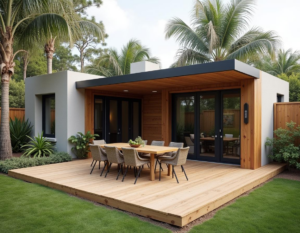Understanding Your Financial Landscape
A comprehensive grasp of your financial situation is essential for making well-informed decisions about your future. By evaluating your income, expenditures, savings, and investments, you can gain clarity on your financial standing and chart a path toward your goals. Whether it involves budgeting, debt clearance, or retirement planning, a thorough understanding of your financial landscape forms the basis for a stable and secure future.
Assessing Your Equity Position
Before delving into financing specifics, it’s crucial to assess your equity position—the portion of your home that you own. High equity expands your financing options. Calculating it involves subtracting your mortgage balance from your home’s value.
For example: If your home is valued at $500,000, and your mortgage balance is $150,000, your equity is $350,000.
Having substantial equity enables options like a cash-out refinance or a Home Equity Line Of Credit (HELOC) to finance your ADU project.
Considering Your Credit Score and Income
A good credit score is key to favorable financing terms. Higher scores reduce the risk for lenders, potentially leading to lower interest rates. A credit score between 670-739 is considered “good,” with higher scores being more attractive to lenders. Additionally, recent regulations allow future ADU rental income to be considered part of your potential income, potentially broadening your loan eligibility.
ADU Financing Options Based on Equity
For High Equity:
-
Home Equity Line of Credit (HELOC): Ideal for those with high equity, a HELOC leverages your home’s value to fund your ADU project.
-
Cash-Out Refinance: Homeowners refinance for more than they owe, converting home equity into funds. However, it involves taking out a new mortgage.
For Low Equity:
-
Construction Loans: Evaluate the property’s future value post-ADU completion, allowing borrowing against the anticipated value increase.
-
Personal Loans: Flexible loans with fixed interest rates, but be cautious due to higher interest rates and potential credit score impacts.
-
Rehabilitation Loans – FHA 203(k): Suitable for purchasing a home and financing significant renovations, often used when building an ADU simultaneously.
For Good Credit Score:
-
Traditional Bank Loans: Standard choice with low-interest rates, but stringent requirements and a lengthy application process.
-
Hard Money Loans, or Peer-to-Peer Lending: Connects borrowers directly with investors but often involves higher interest rates and shorter repayment periods.
For Low Credit Score:
-
Secured Loans: Easier to qualify for with lower interest rates but requires collateral.
-
Government Assistance Programs: Explore federal and state programs that could assist in financing ADUs even with low credit scores.
For Limited Income Scenarios:
-
Grants and Subsidies: Awarded money without repayment requirements, supporting various projects, including ADU construction.
-
Shared Equity Programs: Offer below-market prices or subsidies in exchange for future limitations on resale, promoting affordable housing.
In conclusion, a thorough understanding of your financial situation and exploring personalized ADU financing solutions are vital for a successful ADU project. This strategic approach ensures that your financial resources align efficiently with the unique requirements of your ADU construction, allowing you to focus on bringing your plans to life without unnecessary financial stress.






